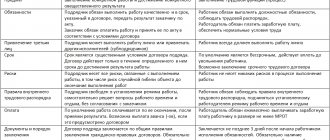What is a contract
A work contract (civil contract of civil law nature) is an agreement in which one party (contractor) undertakes to perform certain work on the instructions of the other party (customer) and deliver its result to the customer, and the latter undertakes to accept the result of the work and pay for it (Art. 702 of the Civil Code of the Russian Federation).
The work contract is considered one of the oldest civil law contracts. It was already known to Roman law, which defined it as hiring work and was divided into three types - hiring of things, contracting, hiring of services.
After the revolution in Soviet legislation, contracting was identified as a separate contractual type. According to the Civil Code of 1922, under a contract, one party (contractor) undertakes, at his own risk, to perform certain work on the instructions of the other party (customer), and the latter undertakes to provide remuneration for completing the task. The Civil Code of 1964 defined a contract as an agreement under which the contractor undertakes to perform, at his own risk, certain work on the instructions of the customer from his or his own materials, and the customer undertakes to accept and pay for the work performed (Article 350).
The Civil Code of the Russian Federation of 1994 identifies the types of construction contracts (Chapter 37):
- domestic;
- construction contract;
- contract for design and survey work;
- contract work for government needs.
A contract with an individual can be used in cases of one-time work. Examples: legal services, office renovation, fence painting, etc.
Contract for construction work: specifics of the contract
Regulatory regulation of obligations to perform construction and installation work is carried out by the general provisions of Chapter. 37 of the Civil Code of the Russian Federation, as well as special rules of paragraph 3, devoted directly to contractual relations in the construction industry.
A construction contract is characterized by a number of features that make it possible to distinguish it from other agreements for the performance of work:
You can find more complete information on the topic in ConsultantPlus. Full and free access to the system for 2 days.
- the activity is carried out directly at the location of the object;
- additional responsibilities are provided for the customer to ensure the necessary conditions for the contractor’s work (this is due, among other things, to the fact that usually the owner of the object or land plot on which work is planned is the customer);
- the contractor must have special legal capacity - to be a member of a construction self-regulatory organization (SRO);
- The general contracting system established by Art. 706 Civil Code of the Russian Federation;
- there is a significant number of special regulations governing construction relations (legislation on investment activities, urban planning norms and rules, etc.);
- It is necessary to comply with special standards and regulations in the field of construction work.
Next, we will consider the main points of a contract between legal entities, for example, between limited liability companies (LLC).
Advantages and disadvantages of a contract with an individual
Such an agreement often attracts the attention of tax authorities. The conclusion of civil contracts that actually regulate labor relations between an employee and an employer is not allowed (Article 15 of the Labor Code of the Russian Federation). Tax authorities may recognize it as work and then the organization may be fined. Evasion from registration or improper execution of an employment contract or the conclusion of a civil contract that actually regulates labor relations between an employee and an employer entails the imposition of an administrative fine (Article 5.27 of the Code of Administrative Offenses of the Russian Federation):
- for officials in the amount of 10 (ten) thousand to 20 (twenty) thousand rubles;
- for persons carrying out entrepreneurial activities without forming a legal entity, from 5 (five) thousand to 10 (ten) thousand rubles;
- for legal entities - from 50 (fifty) thousand to 100 (one hundred) thousand rubles.
In addition, you will have to pay some amounts to the employee (for example, compensation for vacation).
Comparison of contract and employment contract
| Element of difference | Employment contract | Work agreement |
| Purpose of the agreement | The labor process, that is, the performance by an employee of certain functions defined for his position. | Achievement by the contractor of certain results and transfer of the result to the customer within a specified time frame. |
| Salary | Salaries are paid monthly, regardless of the result. | Payment is made based on the results of the work. |
| Subordination | Submits to the internal labor regulations of the organization. | The contractor independently determines how to complete the customer’s assignment. |
| Ownership | Anything created by an employee belongs to the employer. | An item manufactured by a contractor until it is transferred to the customer belongs to the contractor by right of ownership. |
By the way, tax authorities can recognize a contract as a labor agreement only in court. Examples of judicial practice on this issue:
- Resolution of the Federal Antimonopoly Service of the Volga-Vyatka District dated May 25, 2011 in case No. A17-2880/2010. The court found that the employees with whom the Company entered into civil contracts are actually assigned to a specific position, indicating a specific job function and qualifications, and perform work of a certain type, and not one-time tasks.
- Resolution of the Federal Antimonopoly Service of the East Siberian District dated April 24, 2008 No. A33-8071/07-F02-1640/08 in case No. A33-8071/07. The court came to the conclusion that the work was not of a civil law nature, but of a labor nature, since under the terms of the contracts the employee undertakes to perform work in a certain specialty, and the Company undertakes to pay the employee remuneration at certain intervals. From the subject of the contracts it is clear that under the contract not any specific one-time work was performed, but certain functions were performed.
- Resolution of the Federal Antimonopoly Service of the Ural District dated August 18, 2008 No. F09-5783/08-S2 in case No. A71-10321/07. The court found that, in accordance with the contracts, individuals were obliged to perform work in a certain position, specialty or profession, employees worked 5 days a week from 08-00 to 17-00, work on weekends was paid double, employees were subject to labor regulations of the Company, some of the employees underwent professional training at the expense of the Company.
Advantages of a contract for the customer
+1 Quite a free interpretation of the terms of the agreement and its financing;
+2 For remuneration you do not need to pay contributions to the Social Insurance Fund;
+3 No need to pay for vacations and sick leave.
Advantages of a contract for a contractor
+1 Reduction of the personal income tax tax base by the amount of actual expenses that are associated with the fulfillment of contractual obligations. Expenses must be supported by relevant documents.
https://youtu.be/Uk1m-HXlVKc
How to correctly describe the subject of the contract?
According to the requirements of Art. 743 of the Civil Code of the Russian Federation provides for two documents that can clearly define the subject of the contract agreement. These are technical documentation and estimates. Both documents are annexes to the agreement. Thus, it is recommended that the contract itself specify the general characteristics of the subject of the agreement, and indicate a reference to the fact that specific characteristics are contained in the estimate or technical specifications. documentation.
If there is a need to go beyond the agreed subject, the contractor must notify the customer, who makes a decision on this issue. If the customer decides to change the item, then it is limited to certain limits. The transaction price cannot be changed by more than 1/10, and the nature of the work must not change significantly.
The subject of the work must be described as clearly as possible. For example, when building a house, the contract must stipulate:
Have a question? We'll answer by phone! The call is free!
Moscow: +7 (499) 938-49-02
St. Petersburg: +7 (812) 467-39-58
Free call within Russia, ext. 453
- The address where construction work is being carried out.
- Cadastral number of the object and land plot on which construction is carried out.
- Number of floors.
- Area of premises.
- Materials used.
- The procedure for establishing communications.
It is recommended to draw up a detailed plan diagram of the planned construction, as an annex to the contract, which clearly shows all the characteristics of the object, dimensions, etc.
How to draw up a contract with an individual
In the contract agreement (), we recommend taking into account the following points:
- Start and end date of work;
- The procedure for payment for work performed;
- List of works or services to be performed (it is necessary to determine the content, volume and result of the work performed by the contractor);
- Requirements for the quality of work performed (requirements that the contractor will be required to comply with);
- Warranty period (the period during which the contractor undertakes to ensure that the quality of the work result complies with the terms of the contract and is responsible to the customer for identified deficiencies in the work result);
- The procedure for acceptance and delivery of work;
- Responsibility of the parties;
- Contract time.
After completing the work, a certificate of completion of work is drawn up on the basis of a contract. The act is signed by an individual and a manager. The act indicates the amount of remuneration. This agreement frees the organization from the obligation to pay for work every six months; payment occurs only within the terms specified in the agreement. For violation of payment terms for work or services, the customer is liable in the form of interest, based on the refinancing rate of the Central Bank of the Russian Federation (Article 395 of the Civil Code of the Russian Federation). When concluding a contract, we recommend specifying the duration and type of work to be performed, and the price of the contract. In this case, the price may consist of two parts: remuneration for the contractor’s work and compensation for his costs (Article 709 of the Civil Code of the Russian Federation). All this is important so that the tax inspectorate does not consider the contract to be a labor contract.
How to draw up a construction contract (cheat sheet)
Let's look at the procedure for drawing up a contract section by section.
Subject of the transaction
The subject of the agreement must be formulated as clearly as possible. It is advisable to describe in detail what work the contractor must perform and in what volume, rather than limiting it to the phrase:
Build a two-story building at the address Moscow, lane. Spring.
It is necessary to indicate the name of the work with a description of its volume, content and process. It is necessary to describe in detail the required result - the name and type of the object, its engineering and technical parameters.
Turnaround time
Determining deadlines is important from both a legal and accounting point of view. They are given attention in PBU 2 2008: accounting for construction contracts.
The completion date can be specified in the contract in several ways:
- simple calendar date (until 12/31/2020);
- indicating the exact number of calendar (working) days from the start of construction (within 50 days);
- indicating the start and end dates;
- indicating an event that must inevitably occur, or the expiration of a period of time ([K=6; P=190; T=Article 190 of the Civil Code of the Russian Federation]).
Deadlines can be exact or floating, they can be indicated in the form of implementation schedules, and detailed in applications. Interim deadlines are indicated as necessary.
Contract price and payment procedure
The price may be fixed or indicative. The construction estimate serves to determine it and can be referred to in the contract. As for the payment procedure, the following options are possible:
- prepayment of the entire amount (100% advance);
- payment after completion of work (no advance);
- staged payment (partial advance payment).
A condition may be stipulated regarding the raw materials supplied or that the work is performed from the contractor’s materials. The payment period can be tied to the execution of any one or all stages or to other circumstances provided for by law or contract (clause 1 of Article 314 of the Civil Code of the Russian Federation). The text may also include a condition on the guaranteed retention of part of the contractor’s remuneration (5-10%) until the successful acceptance of the object.
Who pays taxes and fees under a contract with an individual
Personal income tax
Remuneration for work performed or service provided relates to income from sources in the Russian Federation and is subject to personal income tax (Article 208 of the Tax Code of the Russian Federation). Taxation is carried out at a tax rate of 13% (Article 224 of the Tax Code of the Russian Federation), if an individual is a resident of the Russian Federation, or at a tax rate of 30%, if an individual is a non-resident of the Russian Federation. Organizations from which or as a result of relationships with which an individual receives income are recognized as tax agents - they are charged with the responsibility for calculating personal income tax, withholding it from the taxpayer and paying the withheld amount of tax to the budget (Article 226 of the Tax Code of the Russian Federation). The same article of the Tax Code of the Russian Federation contains exceptions - transactions with securities, winnings. Income in the form of remuneration for performing work under a civil contract is not specified in these standards.
An organization that pays income to an individual under a work contract is a tax agent in relation to such income. Obliged to withhold the accrued amount of tax directly from the taxpayer’s income upon actual payment and submit information about such income to the tax authority at the place of registration (form 2-NDFL). Withholding is made from any funds paid by the agent to the taxpayer, including advance payments. In this case, the withheld tax amount cannot exceed 50% of the payment amount. The organization transfers the tax withheld from an individual to the budget at the place of its registration with the tax authority.
If a tax agent cannot, for some reason, withhold the amount of tax from the taxpayer, then he is obliged to notify the taxpayer and the tax authority at his place of registration in writing about the impossibility of withholding the tax and indicate the amount of tax.
If the tax agent does not fulfill his duties (calculation, withholding, transfer), he faces a fine of 20% of the amount subject to withholding and (or) transfer (Article 123 of the Tax Code of the Russian Federation).
Insurance premiums
The situation is similar with insurance premiums. Payments under civil contracts in favor of individuals, the subject of which is the performance of work or the provision of services, are subject to insurance premiums (Article 420 of the Tax Code of the Russian Federation).
The exceptions are:
- payments and other remuneration within the framework of civil contracts, the subject of which is the transfer of ownership or other proprietary rights to property (property rights), and contracts related to the transfer of property (property rights) for use, with the exception of contracts for author's order, contracts for alienation of the exclusive right to the results of intellectual activity, publishing license agreements, license agreements granting the right to use the results of intellectual activity;
- payments and other remuneration in favor of individuals who are foreign citizens or stateless persons under employment contracts concluded with a Russian organization to work in its separate division, the location of which is outside the Russian Federation;
- payments and other remuneration calculated in favor of individuals who are foreign citizens or stateless persons in connection with their activities outside the Russian Federation;
- payments to volunteers, volunteers (Article 17 No. 135-FZ);
- payments to foreign citizens and stateless persons under employment contracts or under civil law contracts, which are concluded with FIFA (Federation Internationale de Football Association) and the subject of which is the performance of work, provision of services, as well as payments made to volunteers under civil law contracts, which are concluded with FIFA, FIFA subsidiaries.
So, the remuneration of an individual for performing work under a contract is subject to contributions to the Pension Fund of the Russian Federation (PFR) and the Federal Compulsory Medical Insurance Fund (FFOMS). Insurance premium rates.
Attention. The amount of remuneration is not included in the base for calculating insurance premiums payable to the Social Insurance Fund of the Russian Federation (FSS RF). Such an obligation arises only if compulsory insurance against industrial accidents and occupational diseases is specified in the contract.
Correct description of the terms of the subject in the contract agreement
A construction contract mediates a set of measures for the construction, reconstruction and major repairs of buildings (including residential), enterprises, structures or other objects, including all work related to the object under construction.
Subject of the contract persons with legal entities person is assessed through the types of work that the contractor must perform, and is considered agreed upon if the parties have specified:
- types of work to be performed and their volume;
- the facility where the activity is planned;
- desired result.
The types of work can be agreed upon by the parties in the text of the contract itself or in the attached technical documentation (clause 1 of Article 743 of the Civil Code of the Russian Federation). The requirements for the preparation of project documentation are approved by the Decree of the Government of the Russian Federation “On the composition of sections of the design…” dated 02.16.2008 No. 87. However, the lack of approved technical documentation is not an absolute reason for recognizing the contract as not concluded (clause 5 of the information letter of the Presidium of the Supreme Arbitration Court of the Russian Federation dated 24.01. 2000 No. 51).
Depending on the specifics of the property (for example, a residential building is an architectural monument), the procedure for carrying out work may be regulated by various, including special, laws (Law “On Objects of Cultural Heritage...” dated June 25, 2002 No. 73-F).
Cost of construction work on wood
Considering that construction services involve a considerable volume, their cost is usually determined by drawing up an estimate, including all costs, including equipment and building materials.
Therefore, when filling out the DSR in the cost section, you must refer to the estimate, which becomes an annex to the contract. When calculating the cost of construction services for wood, it is also necessary to draw up an estimate, since manipulations with wood, and the materials themselves, are quite expensive. Nevertheless, working with wood pays off, providing an indescribably cozy look to the object. With the help of wooden structures you can provide any interior style - from classic to high-tech.
Wooden structures are safe for health and have a positive effect on humans. And in facilities such as a sauna or bathhouse, wooden finishing is irreplaceable, where the walls and ceiling are lined with clapboard and other wooden elements.
In the hands of professionals, wood trim is economical, with virtually no waste. The advantage of wood is its high heat and sound insulating properties. However, we must always remember that this material is subject to rotting and burning. Therefore, when working with wood, you must always remember this and follow the necessary fire safety rules, ensuring that wooden structures are treated with special impregnations, which undoubtedly affects the cost of construction.
The type of fasteners also affects the price of wood construction services. If nails are used for this, this is one price, but when using all kinds of clamps and special devices for fastening wooden elements, it is another.
In addition, the prices for wood are affected by the selected material (panel, lining, etc.). For example, covering walls with Euro-class pine clapboard will cost the customer up to 600 rubles per square meter.
Thus, when concluding a construction contract for wood, the contract price must be determined by the estimate in accordance with Art. 746 of the Civil Code of the Russian Federation.
Turnaround time
The deadlines for completing the task are an essential condition of the DSR.
Therefore, when signing an agreement, it is required to indicate not only the duration of the DSR, but also the time of completion of construction, displaying intermediate deadlines for monitoring the construction process. It will also be necessary to prescribe penalties for failure to meet deadlines, including until the agreement is terminated (clause 2 of Article 405 of the Civil Code of the Russian Federation).
The construction period can be expressed:
- Calendar dates.
- A period of time.
The timing of construction work is regulated by Art. 708 and 740 of the Civil Code of the Russian Federation, where it is noted that the DSR is required to display the start and completion dates of construction, as well as intermediate dates of individual stages of construction.
Subtleties of drawing up an agreement
Important terms of the contract are: subject, price and deadlines. Failure to specify any of the terms may result in the contractual obligations being invalid.
There may be several nuances of agreement:
- Subject of the agreement. This is reconstruction, construction again or restructuring of an existing facility. It is necessary to indicate the name of the object of reconstruction or creation again. List all types of work performed. If you plan to increase prices, then you need to register a percentage.
- Price. It is necessary to indicate the price of the issue in contractual obligations. The price indicator is indicated in rubles, fixed or approximately. If the contract for construction work is long-term and payment must be made in stages, then payments must be made every month or quarter. The additional agreement specifies the amount. The calculation is carried out on the basis of an agreement. This is regulated by legal documents.
- Terms of fulfillment of contractual relations. The Civil Code provides clear deadlines for the completion of work. The deadlines are defined clearly and understandably, they can be changed by bilateral decision.
- Risks. This is an important part of contractual relations; they must be provided for and stated in the agreement. List of risks: loss of materials, mechanisms, technical devices and other equipment. Each party is responsible for damage and loss of property. After the work has been carried out and accepted, a case of property damage occurs, but the damage associated with the loss is shifted to the shoulders of the customer.
All nuances must be specified in contractual obligations.
About the pros and cons of the GPC agreement
When concluding a civil law contract, you will need to sign certificates of acceptance of services. The paragraphs of the document indicate the customer’s registration data, deadlines, and personal information of the employee. It is not recommended to issue conclusions for a long period.
Advantages of registration under a civil law contract:
- A small package of documents (passport, SNILS, TIN).
- The customer does not control the time spent at the workplace; the main thing is to deliver the work on time.
- The work experience of the performer is preserved, since deductions for him are transferred to the Social Insurance Fund and the Pension Fund of the Russian Federation.
- No proof of worker qualifications is required.
The disadvantages of GPC agreements include:
- Entries are not entered into the work book.
- Social guarantees such as weekends, holidays, sick leave and vacation are not provided.
- Difficult processes for resolving the issue of insurance premiums.
- There is no compensation for closing a business due to bankruptcy.
- When the contract is closed, by decision of the contractor, a penalty will be paid to the customer.
Advice! It is advantageous to conclude civil law agreements in the case of one-time cooperation. It is recommended to draw up an employment contract for a long period of time.
Legal requirements
Based on the concluded agreements, the complexity and complexity of relations arises, which provokes controversial situations. The regulation of issues under construction contracts is justified by the decision of arbitration courts. Such contractual relationships are the most common. This issue is reflected at the legislative level.
In production activities, clear contractual relationships are necessary. Agreements are bilateral, as they are signed by two parties.
To exclude undesirable events, it is necessary to involve a lawyer whose actions will be aimed at:
- Calculate the risks of possible situations.
- What legal disputes may arise as a result of the events.
- Preparation of contractual obligations governing defense in arbitration courts.
The contract can be concluded in the following areas:
- Work related to reconstruction, installation or construction.
- Performing design or survey functions prior to construction work.
- Works for government needs.
Based on the studied materials on judicial practice, an important circumstance is the terms of the contract. This is worth paying attention to. Essential characteristics include the subject of contractual relations and the timing of fulfillment of obligations.
The terms of contractual obligations are violated. The violator is the consumer or contractor. This is characterized by three characteristics.
Conditions of obligation or criteria:
- Regulatory legislative acts, items from which were not referenced.
- Demands put forward in one direction.
- Debts under contractual relations.
To protect interests, it is necessary to attract specialists.
The main responsibilities of the contractor under the contract
- start completing the task and complete it within the prescribed time frame;
- complete the task at the price established in the estimate or promptly notify the customer of an increase in costs;
- when providing equipment and materials by the customer, use them sparingly and carefully;
- Finally, prepare a detailed financial report;
- transfer to the customer full rights to the manufactured product or work performed;
- If circumstances arise that disrupt the deadlines, notify the customer in a timely manner.
The work performed must meet the requirements of state standards, technical specifications and legislative norms.
What violations occur
Cases of violation of contractual relations:
- Violations of work deadlines. The customer should take measures to correct the situation: enter into an additional agreement. If this does not happen, then the regulation of the clauses of the agreement is carried out through the court. In this case, the following is awarded: payment of a percentage of the penalty, compensation for losses or payment of interest.
- If the payment deadline for services rendered is missed. The contractor is recommended to enter into an agreement with the customer to establish a new payment deadline. You can submit documents to the court after the agreement has not been fulfilled.
- The quality of work or services does not comply with the regulations. The customer needs to set out in writing the requirements determined by him and then determine the time frame for eliminating the comments.
All of the above violations occur frequently. Then you have to regulate disputes.
What types of liability
Liability under a contract can be determined based on the following:
If damages are caused due to inconsistency in the quality of the work performed, that is, compensation for damage is provided. When lost profits are justified, then the damage is easy to calculate.
According to the article of civil legislation, the payment of interest is determined, since unpaid funds will generate profitability.
A fine is a payment for a penalty. This is a punishment for violating a contractual obligation clause.
The contract should include: under what circumstances it is necessary to compensate for the damage caused. Relations governed by obligations are different. Establishing rules that contradict legislative acts is illegal.







